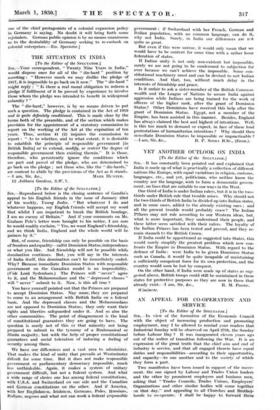THE SITUATION IN INDIA [To the Editor of the SPECTATOR.]
Sns,—Your correspondent, " Twenty Nine years in India," would dispose once for all of the "die-hard position by asserting : " However much we may dislike the pledge of 1917, it is impossible to go back on it now." The " die-hard
might reply ; there a real moral obligation to redeem a pledge if fulfilment of it be proved by experience.to involve those whom the pledge was intended to benefit in wideipread calamity ? " _
The " die-hard," however, is by no means driven to put such a question. The pledge is contained in the Act of 1919 and is quite definitely conditional. This is made clear by the terms both of the preamble, and of the section-which makes provision for the appointment of a statutory commission to report on the working of the Aet at the expiration of ten years. Thus;" section '41 (2) requires the commission to report : " As to whether, and to what extent, it is desirable to establish the principle of responsible government [in British India] or to extend, modify, or restrict the degree of responsible government then' existing therein." It is those, therefore, who persistently ignore the conditions which are part and parcel of the pledge, who are determined to go back on the pledge ; not those who, like the " die-hards," are content to abide by the prOvisions of the Act as it stands.
—I am, Sir, '&c.; MARK HUNTER. 12 Ashburn Gardens, S.W. 7.
























































 Previous page
Previous page